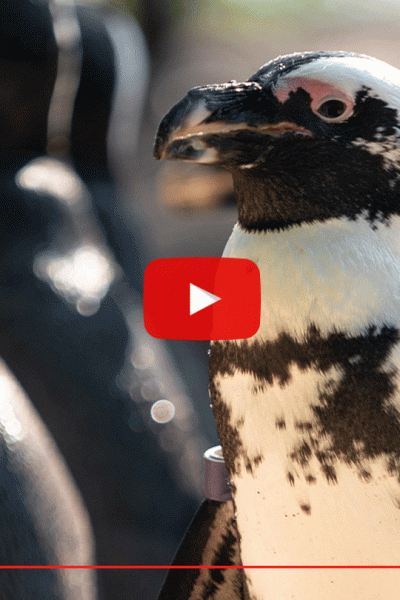During the cooler months, African penguins mostly focus on nesting and eating. As daylight hours decrease, they naturally pair up and settle in for snuggle season. While penguins don’t technically mate for life, they are monogamous and typically stay with the same partner during breeding season.
The sixteen ‘flockstars’ at CMZoo have been together since Water’s Edge: Africa opened in 2020 (and some were together before that). Most seem to have settled into their pairings or friendships. Bonded pairs can be identified by the color and placement of their bands. Females wear a band on the left flipper, and males wear them on the right. If you see two penguins with the same color bands, they’re bonded, which means they nest together. Twelve of the CMZoo African penguins are bonded, while the remaining four regularly hang out together but are not actively nesting with another penguin.
African penguins were recently relisted from ‘endangered’ to ‘critically endangered’ by the International Union for the Conservation of Nature (IUCN) Red List. The number of wild breeding pairs has fallen below 10,000, and African penguins could be extinct in the wild by 2035. But, there is hope.
Every visit to CMZoo is conservation in action. Through membership dues and admissions, CMZoo guests and members have sent $159,675 to SANCCOB (Southern African Foundation for the Conservation of Coastal Birds), in support of African penguin conservation, since 2010.
Wild African penguin populations face many threats that continue to cause them to struggle in the wild, including:
— commercial overfishing – reducing the availability of prey species like sardines and anchovies
— habitat degradation – oil spills and plastic waste affects many marine species, including African penguins
— disease outbreaks – such as bird flu can compromise an already vulnerable species
In 2020, CMZoo joined AZA SAFE African Penguin. SAFE (Saving Animals From Extinction) is a collaborative conservation effort supported by the Association of Zoos and Aquariums (AZA) and their accredited members. Under this commitment, the Zoo sends $3,000 annually to SANCCOB in support of their Robben Island Ranger project. This ranger closely monitors the Robben Island penguin colony in South Africa, helping researchers keep track of the penguin population. The ranger also plays an important role in the direct care of penguins, and other seabirds, by identifying and transporting birds in need of medical attention to the SANCCOB rescue and rehab facility for treatment and eventual re-release.
Be sure to stop by Water’s Edge: Africa and see the flock during your next trip to CMZoo!

